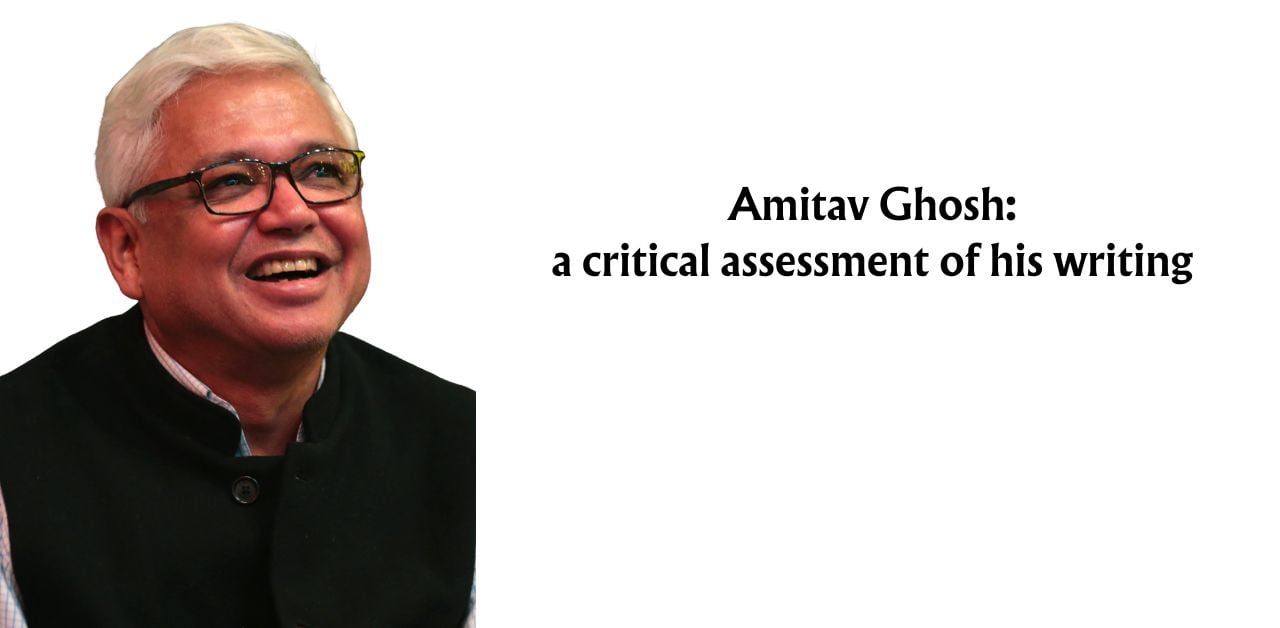Amitav Ghosh – Analysis of his writing style, themes and thoughts on him as a novelist
If you are an Indian who loves reading books, contemporary novels included, you must have heard about Amitav Ghosh. Amitav Ghosh, a celebrated contemporary novelist, is respected because he has made significant contributions to modern literature with his captivating narratives and thought-provoking themes. Though the author has received many accolades and enjoys worldwide fame because of his bestselling and critically acclaimed novels, many new readers might be interested in knowing a bit or two about the style and scope of Ghosh’s writing. And therefore, I have decided to write something about Amitav Ghosh and his writing style in this article. This article, or paper in appropriate terms, delves into the major features of Ghosh’s writing, highlighting his unique literary style through relevant examples from his novels. Additionally, I have also ensured that it offers a comparative analysis between Ghosh and other contemporary novelists, shedding light on his distinct voice within the literary landscape. At the same time, I have also tried to give my input on the limitations that Ghosh has as a novelist. At last, this analysis aims to provide a comprehensive understanding of Ghosh’s writing and its significance in the realm of contemporary literature.
I. Major Features of Amitav Ghosh’s Writing:
1. Historical Depth and Rich Cultural Context:
Many of Ghosh’s novels are characterised by their extensive research, historical accuracy, and meticulous attention to detail. The author seamlessly weaves together fictional narratives with real historical events, offering readers an aesthetically and factually rich experience. An exemplary novel in this regard is “The Shadow Lines” (1988), where Ghosh explores the complexities of identity and borders against the backdrop of major historical events such as the Swadeshi movement and the Partition of India. Once you start reading the novel, you will be able to locate the historical incidents very clearly even though you are going through fictional records of imaginative events. This is the richness that Ghosh offers his readers most of the time.
2. Global Themes and Wide Appeal:
It is a well-known fact that the writings of Ghosh offer a global perspective, subjects affecting not one or two nations but a major part of the world, and characters that resonate with a global audience. In doing so, one can visibly comprehend that Ghosh’s writing transcends geographical boundaries and vividly explores the interconnectedness of people and nations. In his renowned “Ibis Trilogy,” comprising three bestselling and critically acclaimed novels “Sea of Poppies” (2008), “River of Smoke” (2011), and “Flood of Fire” (2015), Ghosh authoritatively delves into the global opium trade and its impact on individuals from different cultures. His narratives highlight the interplay between individuals and larger historical forces, emphasising the universal nature of human experiences. And this may be a reason (among many) that his novels appeal to a wider audience in many different countries.
3. Environmental Consciousness:
It’s not even thought, let alone said, to be an exaggeration when I say that the Indian academia has based the search for ecological consciousness or ecocritical perspectives in contemporary Indian literature recently, and it is largely based on the Bengal-centric writings of Ghosh! Ghosh’s writing often emphasises the intricate relationship between humans and the environment. In his bestselling and critically appreciated work “The Hungry Tide” (2004), he skilfully intertwines the lives of his characters with the fragile ecosystem of the Sundarbans, exploring relevant themes of climate change, ecological imbalance, and the human struggle for survival. Though a few critics believe that his environmentally conscious approach may reflect his concerns about the pressing issues of our time, I don’t subscribe to this view. A writer writes what performs well. Amitav Ghosh does the same. However, the issues he raises do reverberate far and wide (and last long).
4. Linguistic Experimentation:
I often admit with an open mind that Ghosh is only one among many contemporary Indian novelists who can be said to have the literary vision, linguistic depth and a wide knowledge of subjects of importance compared to anyone else! Once you start reading him, you will find that Ghosh’s writing exhibits a linguistic finesse, blending multiple languages, dialects, and registers (successfully and naturally). This technique adds authenticity and depth to his characters and settings. In “The Calcutta Chromosome” (1995), he masterfully incorporates elements of science fiction, historical fiction, and speculative fiction, experimenting with narrative techniques to create a truly unique reading experience. Readers and critics have appreciated that work with open hearts, emphasising linguistic richness.

II. Comparative Analysis with Other Contemporary Novelists:
1. Salman Rushdie:
Well, if you compare Ghosh to Salman Rushdie, it reveals interesting contrasts. It is true that both authors explore themes of identity and cultural hybridity, Rushdie’s writing is characterised, largely, by magical realism and postmodern techniques. In contrast, Ghosh’s narratives tend to be rooted in historical events and feature realistic portrayals of characters according to time and location. Therefore, you can conclude that Rushdie has an appeal among literary readers while Ghosh may be read by ordinary people looking for fictional respite.
2. Arundhati Roy:
When compared to Arundhati Roy, Amitav Ghosh comes out as the factual winner! No competition here, guys! 🙂 Critically, Ghosh’s writing style can be seen as more research-driven and historically focused. This quality adds validity and authenticity to his narratives. On the other hand, Roy’s works, such as “The God of Small Things” (1997), emphasise superficially elaborate language and a nonlinear narrative structure that lacks historical, factual or depth of any other kind as well as authenticity. Rhetoric, in the case of Arundhati Roy, doesn’t meet adequate support otherwise (required in fiction). Ghosh’s novels often follow a more traditional storytelling format, on the contrary, with a balanced offering in terms of language, style, themes, subjects and issues discussed.
III. Limitations of Ghosh’s Writing Style:
1. Pacing and Length:
Many critics from different countries have noted that Ghosh’s novels can be lengthy and slow-paced, requiring patience from readers. No doubt that it allows for an in-depth exploration of themes and rich character development, but it may deter some readers from seeking a faster-paced narrative. In other words, while readers who are following their academic pursuits may go to the lengths, casual and general readers who read novels for entertainment and recreation might find themselves alienated, bored or just uninterested in going through the details (otherwise intellectual and unnecessary compared to what modern readers often read).
2. Excessive Detail:
Just an extension to the point discussed above, Ghosh’s meticulous attention to detail, although a strength, can at times result in an excess of information, overwhelming readers and indirectly detracting from the overall flow of the narrative. For example, if you remember the novels like The Shadow Lines and The Hungry Time, you must remember those intricate details (that become boring after a point).
3. Lack of Solutions:
That Ghosh highlights major problems of our time, is a fact beyond doubt. However, as a reader, one might like to understand the possible resolutions of those issues. Nevertheless, that part is seldom seen in the works by Ghosh. He brings us face-to-face with pressing problems and leaves the room with many questions.
Some famous novels by Ghosh you may enjoy reading:
1. The Shadow Lines:
This novel masterfully explores the intricacies of borders, identity, and memory against the backdrop of significant historical events. Get it from Amazon India – click here.
2. The Hungry Tide:
The famous novel by Ghosh, set in the Sundarbans, delves into the lives of characters struggling to coexist with nature and the challenges posed by climate change. Buy from Amazon India – click here.
3. Sea of Poppies:
The first instalment of the “Ibis Trilogy,” this novel explores the opium trade and its far-reaching consequences. Get a copy from Amazon India – click here.
Conclusion:
Famous writer Amitav Ghosh’s writing stands out due to many reasons. The first one is historical depth – no book by Ghosh lacks this quality that helps the author and his work stand out. Cultural context also adds another dimension to the writings of Ghosh by featuring stories that connect with people in different parts of the world. Likewise, interconnectedness, environmental consciousness, and linguistic experimentation, as explained above, add value and width to the novels written by Ghosh. With everything in consideration, it is easily believable that Ghosh’s novels offer readers a unique perspective on global themes and human experiences. If you are looking to read a novelist who offers seriousness wrapped in a contemporary set-up that can keep readers attached to the story, go no further! Just pick up a copy of any of the many novels written by Ghosh and you will have a good time reading the same. You can pick up any novel from above or just go to Amazon and explore for yourself. I am sure you will find it interesting. All the best!
Article by BharatiyaSamikshak

Very impressive article… It outlines all the important aspects of the writing style of Amitav Ghosh, the famous Indian novelist. I truly liked the way you have put all important factors, themes, writing styles, genres, and the important elements of his fiction and narrative. Thanks buddy!
Very detailed analysis! Thanks for this article friend.